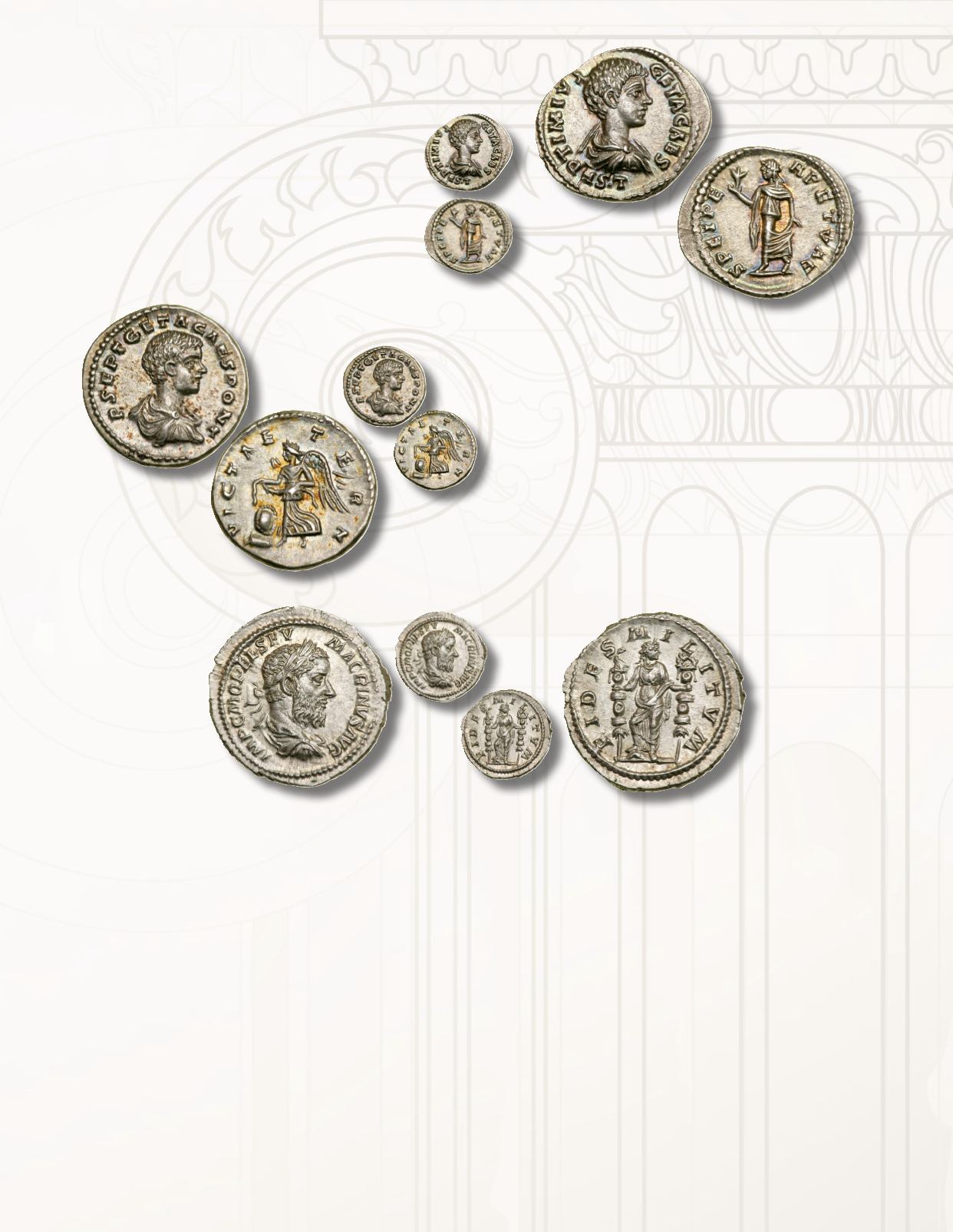
170
3196
Geta. Silver Denarius (2.7 g), as Caesar, AD
198-209.
Laodicea ad Mare, under Septimius
Severus and Caracalla, AD 198-200. L SEPTI-
MIVS GETA CAES, bare-headed, draped and
cuirassed bust of Geta right.
Reverse:
SPEI PE-
RPETVAE, Spes advancing left, holding flow-
er and lifting hem of skirt. Cf. RIC 96 (bust);
BMC 688; RSC 192a. Boldly struck on a full
flan and fine style. Gorgeous iridescent ton-
ing on both sides.
Superb Extremely Fine.
Estimated Value ..................................$500 - 600
3197
Geta. Silver Denarius (3.5 g), as Caesar, AD 198-209.
Laodi-
cea ad Mare, under Septimius Severus and Caracalla, AD 200-
202. P SEPT GETA CAES PONT, bare-headed, draped and
cuirassed bust of Geta right.
Reverse:
VICT AE-TE-R-N, Vic-
tory flying left, holding open diadem in both hands over shield
set on low base. RIC 101; BMC 723; RSC 206. Well struck
and well centered, delicately toned.
Superb Extremely Fine.
Estimated Value ............................................................. $200 - 250
Ex Goldberg 69 (29 May 2012), 3581.
3198
Macrinus. Silver Denarius (3.5 g), AD 217-218.
Rome. IMP C M OPEL SEV MACRINVS AVG, laureate, draped and cuirassed bust of
Macrinus right.
Reverse:
FIDES MILITVM, Fides standing facing, head right, resting foot on globe, holding two standards. RIC 67; BMC
65; RSC 23f. Well struck and well centered on a large flan, lightly toned.
Superb Extremely Fine.
The first equestrian to attain the throne of Rome, Macrinus was of Berber descent fromMauretania. He had been a notable jurist, served
as an important bureaucrat under Septimius Severus, and under Caracalla became prefect of the Praetorian Guard. Suspecting that
Caracalla would execute him because of a prophesy that told he would depose and succeed the emperor - and indeed, according
toDioCassius, members of Macrinus’ staff hadbeen re-assignedbyCaracalla - Macrinus feared for his life. Hewas thus perhaps involved
in the murder of Caracalla in early April AD 217; he was certainly present during the event, although if he was involved he managed to
deflect blame from himself. By April 11, Macrinus had proclaimed himself emperor and named his young son, Diadumenian, as Caesar.
Macrinus’ short reign was marred by military incompetence and appeasement of Rome’s enemies. The worst of these was his de-
feat by the historically inferior Parthians under Artabanos IV, and he forced to pay an enormous indemnity of 200 million sestertii
in return for peace. This led to a loss of popularity with his legions, which was exploited by Caracalla’s aunt, Julia Maesa, and
his cousins, Julia Soaemias and Julia Mamaea. The Severan women had the soldiers of Legio III Gallica based at Raphana pro-
claim Soaemias’s son, Elagabalus, emperor, and they marched on Macrinus’ base at Antioch. Macrinus was soundly defeated
after his troops deserted him, and he was subsequently captured and executed after fleeing towards Rome disguised as a courier.
Estimated Value......................................................................................................................................................................... $700 - 800


